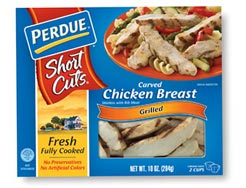Evidence Piece #1:
Evidence Piece #2:
In my group's interview piece, our interviewee, Jackie, talked about buying hormone free Perdue chicken. Though this is clearly a good option, as opposed to hormone injected chickens, I decided to look into it further. I am a skeptic, and I had a feeling I would find out more than I wanted to.
I stumbled up a blog post from Organic Fanatic from 2007. In it, they advocate and support that Perdue does not inject antibiotics or hormones in their chickens for the purpose of growing the chicken quicker or larger. The blog claimed that although Perdue's chicken was not "organic", it was still a good option for those who could not afford "organic". Upon further reading of the comments on this post, I found one particularly interesting:
Fayna said... Perdue chickens are actually fed the antibiotic Bacitracin (also a growth drug).
"What about chickens labeled ''no growth hormones used''? That is just stating the obvious. Although the Agriculture Department has approved the use of growth hormones in beef, it has not sanctioned their use in veal, pork or poultry. But drugs, as opposed to hormones, are another matter. Bacitracin, an antibiotic that is also a growth drug, is part of the feed of many young chickens, including those of Perdue and Bell & Evans. The Agriculture Department, while acknowledging that bacitracin can be a growth drug, characterizes it as an antibiotic, which processors contend are necessary to eliminate disease."
Though the article Fayna references was from 1996, I still think the claim is true. It is from a reliable source (The NY Times), and Perdue's current Q&A section of their website is still a little, shall we say "iffy", with the information about antibiotics given to their chickens. They claim that they while they do not inject hormones or steriods, they still administer some antibiotics for use of basically protecting and prolonging the chickens' health. They do not say exactly what antibiotics they use, which makes me believe that they probably do use bacitracin. As explained in the comment and linked article above, a side-effect of that antibiotic is accelerated growth.
How very convenient.

 RSS Feed
RSS Feed